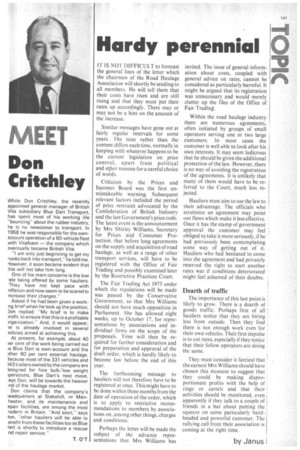Hardy perennial
Page 151

If you've noticed an error in this article please click here to report it so we can fix it.
IT IS NOT DIFFICULT to forecast the general lines of the letter which the chairman of the Road Haulage Association will shortly be sending to all members. He will tell them that their costs have risen and are still rising and that they must put their rates up accordingly. There may or may not be a hint on the amount of the increase.
Similar messages have gone out at fairly regular intervals for some years. The tone rather than the content differs each time, normally in keeping with whatever happens to be the current legislation on price control, apart from political and other reasons for a careful choice, of words.
Criticism by the Prices and Incomes Board was the first unmistakeable warning. Subsequent relevant factors included the period of price restraint advocated by the Confederation of British Industry and the last Government's price code. The latest event is the announcement by Mrs Shirley Williams, Secretary for Prices and Consumer Protection, that before long agreements on the supply and acquisition of road haulage, as well as a range of other transport services, will have to be registered with the Office of Fair Trading and possibly examined later by the Restrictive Practices Court.
The Fair Trading Act 1973 under which the regulations will be made was passed by the 'Conservative Government, so that Mrs Williams should not have much opposition in Parliament. She has allowed eight weeks, up to October 17, for representations by associations and individual firms on the scope of the proposals. Time will then be required for further consideration and for preparation and approval of the draft order, which is hardly likely to become law before the end of this year.
The forthcoming message to hauliers will not therefore have to be registered at once. This might have to be done within three months from the date of operation of the order, which is to apply to restrictive recommendations to members by associations on, among other things, charges and conditions.
Perhaps the letter will be made the subject of the advance representations that Mrs Williams has invited. The issue of general information about costs, coupled with general advice on rates, cannot be considered as particularly harmful. It might be argued that its registration was unnecessary and would merely clutter up the files of the Office of Fair Trading.
Within the road haulage industry there are numerous agreements, often initiated by groups of small operators serving one or two large customers. In most cases the customer is well able to look after his own interests. It may seem ludicrous that he should be given the additional protection of the law. However, there is no way of avoiding the registration of the agreements. It is unlikely that many of them would have to be referred to the Court, much less rejected.
Hauliers must aim to use the law to their advantage. The officials who scrutinize an agreement may point out flaws which make it less effective. Once it has the stamp of government approval the customer may feel obliged to take it more seriously, if he had previously been contemplating some way of getting out of it. Hauliers who had hesitated to come into the agreement and had privately reserved the right to start another rates war if conditions deteriorated might feel ashamed of their doubts.
Dearth of traffic
The importance of ;his last point is likely to grow. There is a dearth of goods traffic. Perhaps first of all hauliers notice that they are hiring less from outside. Then they find there is not enough work even for their own vehicles. Their first impulse is to cut rates, especially if they notice ; that their fellow operators are doing the same.
They must consider it farcical that the earnest Mrs Williams should have chosen this moment to suggest that they could be making disproportionate profits with the help of rings or cartels and that their activities should be monitored, even apparently if they talk to a couple of friends in a bar about putting the squeeze on some particularly Shard' headed and powerful customer. The rallying call from their association is coming at the right time.
by Janus I




























































































































































































































